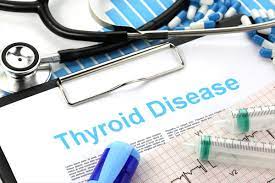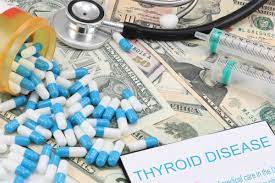Understanding Thyroid Function And Diagnosing Thyroid Issues
The Thyroid Gland is a tiny organ just beneath the Adam's Apple. Despite its diminutive size and butterfly-like shape, it has a powerful effect on human health and physiology. A healthy thyroid is one of the keys to unlocking full vitality.
Hypothyroidism is a condition in which the Thyroid gland is under-active, and it's a common condition that impacts the lives of around 20 million people in the United States. Hypothyroidism is prevalent, but it is also distressingly underdiagnosed. It's estimated that approximately 60% of people with Hypothyroidism don't even know it!
What Does the Thyroid Do?
The Thyroid Gland manages energy distribution to meet the human body's disparate needs. The Thyroid is essentially the control center for metabolism.
That means that if the Thyroid goes haywire, it can affect almost every system in the human body. The thyroid gland is most well-known for its effects on metabolism and thermoregulation, but it's also imperative to several other aspects of human function. 
It promotes good vision, strength, and fertility.
It also maintains the muscles and promotes healthy psychological and cognitive function. Even your nails and skin benefit from a functional Thyroid. Because the Thyroid's effects are so significant and widespread, it can often make an accurate diagnosis of Thyroid Problems a challenge.
What Are Some Signs That I Should Have My Thyroid Checked?
Thyroid Issues are hard to pinpoint because there is no checklist of symptoms set in stone that every patient will experience. Some people may display minor signs of Thyroid Imbalance, such as a disrupted sleep cycle, the onset of anxiety/depression, or slight changes in baseline metabolism/body temperature.
Other people may experience more severe symptoms such as sudden and dramatic changes in blood pressure/blood sugar that can be very dangerous. If you've noticed recent changes in your mental, cardiovascular, or neurological health, this could be a sign of Thyroid Issues. Tough-to-treat anxiety and depression are prevalent signs of Thyroid Problems.
If you think you may have Thyroid Problems, even if you notice very few symptoms, you should get checked out. Most patients only experience a small set of symptoms they can perceive, and a doctor diagnoses other symptoms.
Hypothyroidism vs. Hyperthyroidism
As previously mentioned, the most common form of Thyroid Disorder is Hypothyroidism. This condition suppresses metabolic activity in various ways system-wide. It slows down the body and mind, decreasing your ability to initiate and sustain increased activity levels.
It also slows healing and regeneration, suppresses heart rate, limits cognitive capacity, and reduces the rate at which various organ systems operate. While severe Hypothyroidism becomes easier to diagnose, early signs can appear relatively mild, even if your health and vitality benefit significantly from treatment. Hyperthyroidism, on the other hand, is a condition in which your Thyroid is signaling too much activity.
While not nearly as common as Hypothyroidism, both conditions are hazardous to your long-term health if they reach a certain level of severity. Some more noticeable hyperthyroidism symptoms include racing mind, rapid heartbeat, anxiety, diarrhea, increased appetite, and unexplained weight loss.
Getting Appropriate Treatment for Thyroid Issues
One issue with Thyroid Treatment in the United States is that you may have to go to a Hormone Specialist or reach out for a second opinion to get the treatment you need. Sleep cycles, heart rate, blood pressure, and cholesterol provide strong evidence for diagnosis and treatment.
 While Thyroid Hormone Treatments are very effective and have a shallow risk of significant side effects, some doctors may be more reluctant to sign off on Thyroid Hormone Testing than others.
While Thyroid Hormone Treatments are very effective and have a shallow risk of significant side effects, some doctors may be more reluctant to sign off on Thyroid Hormone Testing than others.
The medical professionals associated with the American College of Endocrinology believe that all patients that suspect Thyroid Issues should get tested for Thyroid Disorders.
Early testing and diagnosis can save a lot of headaches later on. While doctors try to work in your best interest, if you firmly believe that Thyroid Insufficiency or Hyperthyroidism is hurting your life, make an active effort to ensure you get the treatment you deserve.
- 0001 What Is Adrenal Fatigue [Last Updated On: May 20th, 2025] [Originally Added On: October 23rd, 2020]
- 0002 Twelve Steps To Enhance And Preserve Your Memory [Last Updated On: January 28th, 2025] [Originally Added On: October 25th, 2020]
- 0003 The Psychological And Physiological Effects Of Serotonin [Last Updated On: January 28th, 2025] [Originally Added On: October 26th, 2020]
- 0004 The Facts About Psoriasis: Symptoms And Causes [Last Updated On: January 27th, 2025] [Originally Added On: October 27th, 2020]
- 0005 The Facts About Acromegaly [Last Updated On: May 24th, 2025] [Originally Added On: October 28th, 2020]
- 0006 The Effects Of Hgh Deficiency Upon One Of A Pair Of Twins [Last Updated On: January 27th, 2025] [Originally Added On: October 29th, 2020]
- 0007 Resveratrol Anti-aging Supplementation For Longevity [Last Updated On: May 19th, 2025] [Originally Added On: October 30th, 2020]
- 0008 Sermorelin Acetate Injections With Ghrp-6 [Last Updated On: February 18th, 2025] [Originally Added On: October 31st, 2020]
- 0009 Melatonin The Sleep Hormone How It Impacts Your Health [Last Updated On: May 26th, 2025] [Originally Added On: November 1st, 2020]
- 0010 Mark Cuban To Fund Study On Healing Power Of Hgh [Last Updated On: May 27th, 2025] [Originally Added On: November 2nd, 2020]
- 0011 Mark Cuban Advocates For Hgh As A Rehab And Recovery Tool [Last Updated On: January 26th, 2025] [Originally Added On: November 3rd, 2020]
- 0012 Leptin Hormone Guide: The Effects Of The Satiety Hormone [Last Updated On: January 26th, 2025] [Originally Added On: November 4th, 2020]
- 0013 Human Growth Hormone Deficiency Impact On Sleeping Habits [Last Updated On: January 25th, 2025] [Originally Added On: November 5th, 2020]
- 0014 Human Growth Hormone And Liver Regeneration [Last Updated On: January 25th, 2025] [Originally Added On: November 6th, 2020]
- 0015 Hgh Treatment For Fatty Liver Disease On The Horizon [Last Updated On: February 17th, 2025] [Originally Added On: November 7th, 2020]
- 0016 Your Current HGH Level [Last Updated On: March 28th, 2025] [Originally Added On: November 8th, 2020]
- 0017 Ghrelin The Hunger Hormone [Last Updated On: January 24th, 2025] [Originally Added On: November 9th, 2020]
- 0018 Enclomiphene Citrate Andropause Treatment Up For Fda Approval [Last Updated On: January 24th, 2025] [Originally Added On: November 10th, 2020]
- 0019 Dopamine Pleasure Hormone And So Much More [Last Updated On: April 26th, 2025] [Originally Added On: November 11th, 2020]
- 0020 Diabetes Cure On The Horizon [Last Updated On: January 23rd, 2025] [Originally Added On: November 12th, 2020]
- 0021 Boost Metabolism To Lose Weight And Maintain Weight Loss [Last Updated On: January 23rd, 2025] [Originally Added On: November 13th, 2020]
- 0022 Andropause A Mid-life Hormone Crisis [Last Updated On: February 18th, 2025] [Originally Added On: November 14th, 2020]
- 0023 SOGROYA INJECTIONS FOR HUMAN GROWTH HORMONE DEFICIENCY [Last Updated On: February 19th, 2025] [Originally Added On: March 24th, 2021]
- 0024 How Do High and Low Estrogen Impact Male Health and Wellness? [Last Updated On: February 9th, 2025] [Originally Added On: April 2nd, 2021]
- 0025 The Effects Of Hormone Imbalance On Belly Fat [Last Updated On: February 18th, 2025] [Originally Added On: May 8th, 2021]
- 0026 Could Sunlight Help Remove Rogue Hormones from the Water Supply? [Last Updated On: February 20th, 2025] [Originally Added On: May 29th, 2021]
- 0027 Weekly HGH Therapy Just as Effective as Daily Injections [Last Updated On: April 4th, 2025] [Originally Added On: June 18th, 2021]
- 0028 DHEA and Testosterone: A winning team! [Last Updated On: February 14th, 2025] [Originally Added On: January 19th, 2022]
- 0029 Animal Research Discovers Link Between Exercise, HGH, and Cognitive Ability [Last Updated On: February 14th, 2025] [Originally Added On: May 20th, 2022]
- 0030 Weekly Hormone Treatments for Adult HGH Deficiency with Sogroya [Last Updated On: February 18th, 2025] [Originally Added On: June 14th, 2022]
- 0031 Ancient Critters Made Human Hormone System What It Is Today [Last Updated On: March 13th, 2025] [Originally Added On: June 26th, 2022]
- 0032 How Substance Abuse Can Affect Your Hormone Levels [Last Updated On: March 16th, 2025] [Originally Added On: August 4th, 2022]
- 0033 A Holistic Approach to Health and Water Safety [Last Updated On: February 7th, 2025] [Originally Added On: February 7th, 2025]
- 0034 Understanding the Role of Sogroya in Adult Human Growth Hormone (HGH) Deficiency Treatment [Last Updated On: February 12th, 2025] [Originally Added On: February 11th, 2025]
- 0035 Andropause: An Examination of Mid-life Hormonal Shifts in Males [Last Updated On: February 16th, 2025] [Originally Added On: February 13th, 2025]
- 0036 Sermorelin Acetate Therapy: A Comprehensive Insight into its Benefits with GHRP-6 [Last Updated On: February 17th, 2025] [Originally Added On: February 14th, 2025]
- 0037 The Dynamic Duo of Male Vitality: Testosterone and DHEA [Last Updated On: February 14th, 2025] [Originally Added On: February 14th, 2025]
Word Count: 664






